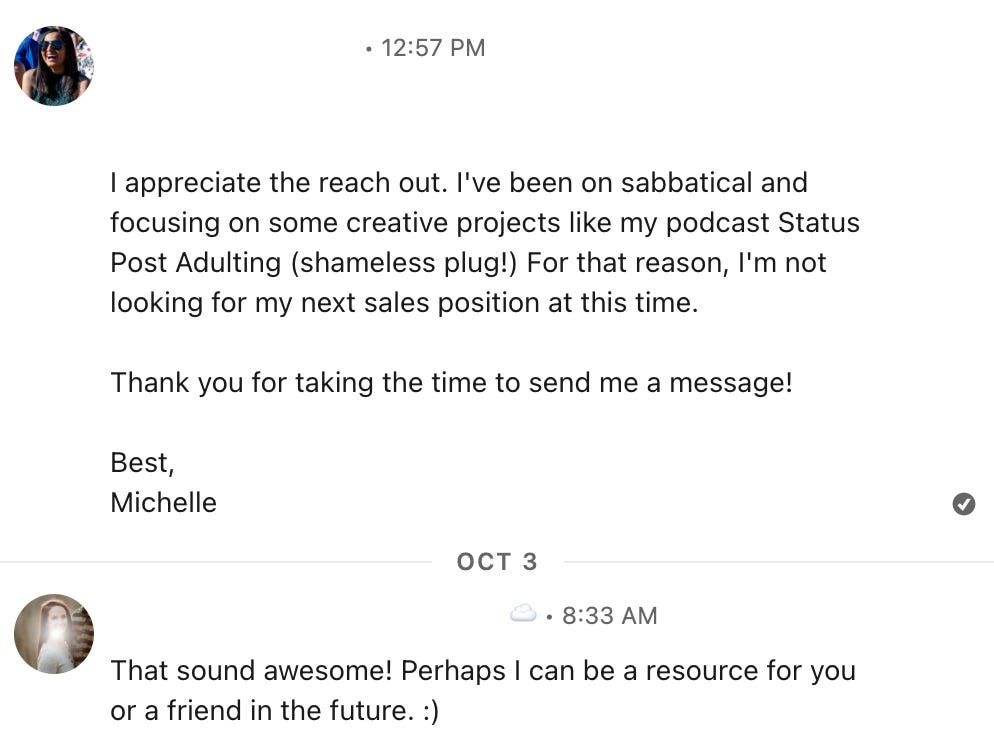On a sunny day outside a winery in Sonoma, my friends and I were swishing Tempranillo in our glasses and engaging in a conversation with a posh married couple sitting near us. They were telling us about how they were traveling around the world, only stopping in wine country to attend a wedding. Curious about their lifestyle, I asked the woman what she did for a living.
“I’m on sabbatical.”
This confused and mesmerized me. I wondered if she was a professor, the only profession I knew of that had sabbaticals. Later, I wondered if this was a way of saying she wasn’t working.
A few years later, I was let go from my job and the word sabbatical found its way to me again. Stressed and unsatisfied with my career, I wanted to take time off from the corporate world.
Unlike the woman in Sonoma, I didn’t choose to travel the world with my non-existent boyfriend. Instead, I chose to move back in with my parents, and later to a small town in the middle of nowhere with my sister. I had traveled plenty before I left the corporate world and knew I wanted to focus on shifting my career path.
Next month is my two year sabbatical-versary and like one does on made up holidays, I find myself reflecting back.
While life outside the 9-5 has been good to me, looking back, there are a couple things I wish I realized sooner to create a more positive sabbatical mindset.
Define A Time Frame
After a stressful end to my last job, I knew I needed a break from the corporate world. Still, I kept saying yes to interview opportunities with any recruiter who reached out to me.
I would agree to a phone screen, struggle to get excited about the hot new sales roles and inevitably tell them I wasn’t ready to interview yet. After a few conversations like this, I realized I didn’t want to go back to work but I also wasn’t fully committed to my sabbatical.
Running the numbers on my savings, I calculated that I could stay out of the traditional workforce for over a year. Knowing this, I set a rule that I wouldn’t entertain any interview requests for a full year.
My goal was to stop feeling guilty and conflicted every time a LinkedIn message popped up on my screen. I didn’t want to waste my time or theirs.
Instead, every time a recruiter reached out, I told them I was happy to connect but that I was on a sabbatical. Surprisingly, almost all of them wrote back expressing how wonderful it was that I was doing so and to reach out if anything changed.
Having a rule in place for interview requests was a small thing that prevented me from getting distracted by every company sliding into my InMails.

Take Time to Deprogram
Sabbatical life has its own rhythm, and it took some time before I was able to relax instead of feeling a pervasive sense of guilt.
Working 40 hours a week is pretty arbitrary, but for the first few months of my sabbatical, I felt like I wasn’t productive because I wasn’t clocking in from 9-5. I was trying to launch a creative career in a silo and felt like I had to justify to myself and others how I was spending my time.
I launched a podcast with my sister, but we worked on that during the weekends and it didn’t make any money. I consumed a lot of information through audiobooks and podcasts, but didn’t count that as “productive” time. There was this nagging feeling inside of me that I wasn’t a productive member of society if I wasn’t working profitable hours.
One of my friends lost her job after I did and I found that she had a similar negative mindset.
After she lost her job, she started going to a local coffee shop almost every day to apply for jobs.
One day while she was there, she helped the barista set up her band's website, fixed another regular’s sales page and answered people’s questions on Reddit about the note taking software Notion.
When we chatted on the phone that week, my friend told me how much fun she had doing all those things. Her tone changed though when she expressed to me how stressed she felt because she wasn’t “doing anything”.
My friend was drawn to helping people in her neighborhood coffee shop during her time off because it brings her joy. When she sees someone having a problem, she loves getting her hands dirty and helping them. However, she didn’t consider it work because she wasn’t getting paid or being recognized for it.
In this conversation, I easily had compassion for my friend who I knew was always doing something. At the same time, I realized I wasn’t the only one who felt like my days weren’t up to snuff because my activities weren’t attached to a paycheck or a job title. I realized I could have compassion for her, but wasn’t applying it to myself.
I decided to look closer at my own sabbatical and saw how my ego was driving my guilt around productivity.
When I was at my job, anything from reaching out to clients to gossiping with my coworker felt like it was classified as “work” because I was at my office and paid to be there. During my time off, I had no one to bill for the evenings I spent drinking tea and watching Jeopardy with my parents. But the latter was more meaningful to me.
My mindset shifted. I knew I was content and I wanted to enjoy each day by being present. I let go of my ego and stopped comparing my days to my 8 hour shifts.
Yelling “Who is Woodrow Wilson” at the television while my parents watched impressed may not have paid the bills, but I learned that happiness trumps billable hours.
Conclusion
Looking back over the past couple years, I see how I had to adjust my mindset so that I could freely be curious and enjoy the present moment.
A sabbatical was a blessing because I had the opportunity to step away from the rat race and learn to build a life that was centered around what brought me meaning.
Two years in, I’m now naturally busier as my creative projects have compounded. The word sabbatical is starting to feel like an old sweater that doesn’t fit quite the same way anymore.
I don’t define myself by whether or not I’m working. Instead, I’ve found a new way to engage with life and work that works better for the person I am now. Having that freedom to move away from the corporate world allowed me to develop this new life.
There’s no real secret to taking time off. For me, the hardest part was letting go of my ego. It was stressful but also a process I needed to go through. I didn’t realize how attached I was to my job title and the number of hours I got paid for. Removing those things forced me to reevaluate what was important to me.
The point isn’t to do a sabbatical right. The point is to be present so you can enjoy it.






You're tempting me!
daaaaang what a beauuutiful article